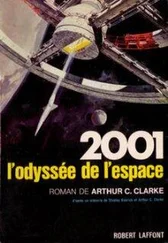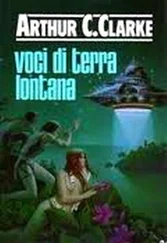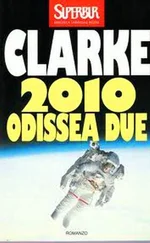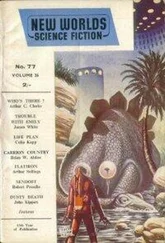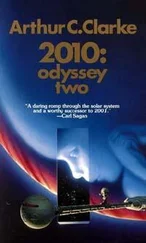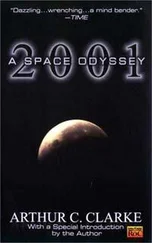Arthur Clarke - 2061 - Odyssey Three
Здесь есть возможность читать онлайн «Arthur Clarke - 2061 - Odyssey Three» весь текст электронной книги совершенно бесплатно (целиком полную версию без сокращений). В некоторых случаях можно слушать аудио, скачать через торрент в формате fb2 и присутствует краткое содержание. Жанр: Фантастика и фэнтези, на английском языке. Описание произведения, (предисловие) а так же отзывы посетителей доступны на портале библиотеки ЛибКат.
- Название:2061: Odyssey Three
- Автор:
- Жанр:
- Год:неизвестен
- ISBN:нет данных
- Рейтинг книги:3 / 5. Голосов: 1
-
Избранное:Добавить в избранное
- Отзывы:
-
Ваша оценка:
- 60
- 1
- 2
- 3
- 4
- 5
2061: Odyssey Three: краткое содержание, описание и аннотация
Предлагаем к чтению аннотацию, описание, краткое содержание или предисловие (зависит от того, что написал сам автор книги «2061: Odyssey Three»). Если вы не нашли необходимую информацию о книге — напишите в комментариях, мы постараемся отыскать её.
2061: Odyssey Three — читать онлайн бесплатно полную книгу (весь текст) целиком
Ниже представлен текст книги, разбитый по страницам. Система сохранения места последней прочитанной страницы, позволяет с удобством читать онлайн бесплатно книгу «2061: Odyssey Three», без необходимости каждый раз заново искать на чём Вы остановились. Поставьте закладку, и сможете в любой момент перейти на страницу, на которой закончили чтение.
Интервал:
Закладка:
At first, the science team treated the geysers as cautiously as if they were vulcanologists approaching Etna or Vesuvius in one of their less predictable moods. But they soon discovered that Halley's eruptions, though often fearsome in appearance, were singularly gentle and well-behaved; the water emerged about as fast as from an ordinary firehose, and was barely warm. Within seconds of escaping from its underground reservoir, it would flash into a mixture of vapour and ice crystals; Halley was enveloped in a perpetual snowstorm, falling upwards... Even at this modest speed of ejection, none of the water would ever return to its source. Each time it rounded the Sun, more of the comet's life-blood would haemorrhage into the insatiable vacuum of space.
After considerable persuasion, Captain Smith agreed to move Universe to within a hundred metres of 'Old Faithful', the largest geyser on the dayside. It was an awesome sight – a whitish-grey column of mist, growing like some giant tree from a surprisingly small orifice in a three-hundred-metre-wide crater which appeared to be one of the oldest formations on the comet. Before long, the scientists were scrambling all over the crater, collecting specimens of its (completely sterile, alas) multi-coloured minerals, and casually thrusting their thermometers and sampling tubes into the soaring water-ice-mist column itself. 'If it tosses any of you out into space,' warned the Captain, 'don't expect to be rescued in a hurry. In fact, we may just wait until you come back.'
'What does he mean by that?' a puzzled Dimitri Mihailovich had asked. As usual, Victor Willis was quick with the answer.
'Things don't always happen the way you'd expect in celestial mechanics. Anything thrown off Halley at a reasonable speed will still be moving in essentially the same orbit – it takes a huge velocity change to make a big differenc. So one revolution later, the two orbits will intersect again – and you'll be right back where you started. Seventy-six years older, of course.'
Not far from Old Faithful was another phenomenon which no-one could reasonably have anticipated. When they first observed it, the scientists could scarcely believe their eyes. Spread out across several hectares of Halley, exposed to the vacuum of space, was what appeared to be a perfectly ordinary lake, remarkable only for its extreme blackness.
Obviously, it could not be water; the only liquids which could be stable in this environment were heavy organic oils or tars. In fact, 'Lake Tuonela' turned out to be more like pitch, quite solid except for a sticky surface layer less than a millimetre thick. In this negligible gravity, it must have taken years – perhaps several trips round the warming fires of the Sun – for it to have assumed its present mirror-flatness.
Until the Captain put a stop to it, the lake became one of the principal tourist attractions on Halley's Comet. Someone (nobody claimed the dubious honour) discovered that it was possible to walk perfectly normally across it, almost as if on Earth; the surface film had just enough adhesion to hold the foot in place. Before long, most of the crew had got themselves videoed apparently walking on water...
Then Captain Smith inspected the airlock, discovered the walls liberally stained with tar, and gave the nearest thing to a display of anger that anyone had ever witnessed from him.
'It's bad enough,' he said through clenched teeth, 'having the outside of the ship coated with – soot. Halley's Comet is about the filthiest place I've ever seen...'
After that, there were no more strolls on Lake Tuonela.
19 – At the End of the Tunnel
In a small, self-contained universe where everyone knows everyone else, there can be no greater shock than encountering a total stranger.
Heywood Floyd was floating gently along the corridor to the main lounge when he had this disturbing experience. He stared in amazement at the interloper, wondering how a stowaway had managed to avoid detection for so long. The other man looked back at him with a combination of embarrassment and bravado, obviously waiting for Floyd to speak first.
'Well, Victor!' he said at last. 'Sorry I didn't recognize you. So you've made the supreme sacrifice, for the cause of science – or should I say your public?'
'Yes,' Willis answered grumpily. 'I did manage to squeeze into one helmet – but the damn bristles made so many scratching noises no-one could hear a word I said.'
'When are you going out?'
'Just as soon as Cliff comes back – he's gone caving with Bill Chant.'
The first flybys of the comet, in 1986, had suggested that it was considerably less dense than water -which could only mean that it was either made of very porous material, or was riddled with cavities. Both explanations turned out to be correct.
At first, the ever-cautious Captain Smith flatly forbade any cave-exploring. He finally relented when Dr Pendrill reminded him that his chief assistant Dr Chant was an experienced speleologist – indeed, that was one of the very reasons he had been chosen for the mission.
'Cave-ins are impossible, in this low gravity,' Pendrill had told the reluctant Captain. 'So there's no danger of being trapped.'
'What about being lost?'
'Chant would regard that suggestion as a professional insult. He's been twenty kilometres inside Mammoth Cave. Anyway, he'll play out a guideline.'
'Communications?'
'The line's got fibre optics in it. And his suit radio will probably work most of the way.'
'Umm. Where does he want to go in?'
'The best place is that extinct geyser at the base of Etna Junior. It's been dead for at least a thousand years.'
'So I suppose it should keep quiet for another couple of days. Very well – does anyone else want to go?'
'Cliff Greenburg has volunteered – he's done a good deal of underwater cave-exploring, in the Bahamas.'
'I tried it once – that was enough. Tell Cliff he's much too valuable. He can go in as far as he can still see the entrance – and no further. And if he loses contact with Chant, he's not to go after him, without my authority.'
Which, the Captain added to himself, I would be very reluctant to give...
Dr Chant knew all the old jokes about speleologists wanting to return to the womb, and was quite sure he could refute them.
'That must be a damn noisy place, with all its thumpings and bumpings and gurglings,' he argued. 'I love caves because they're so peaceful and timeless. You know that nothing has changed for a hundred thousand years, except that the stalactites have grown a bit thicker.'
But now, as he drifted deeper into Halley, playing out the thin, but virtually unbreakable thread that linked him to Clifford Greenburg, he realized that this was no longer true. As yet, he had no scientific proof, but his geologist's instincts told him that this subterranean world had been born only yesterday, on the time-scale of the Universe. It was younger than some of the cities of man.
The tunnel through which he was gliding in long, shallow leaps was about four metres in diameter, and his virtual weightlessness brought back vivid memories of cave-diving on Earth. The low gravity contributed to the illusion; it was exactly as if he was carrying slightly too much weight, and so kept drifting gently downwards. Only the absence of all resistance reminded him that he was moving through vacuum, not water.
'You're just getting out of sight,' said Greenburg, fifty metres in from the entrance. 'Radio link still fine. What's the scenery like?'
'Very hard to say – I can't identify any formations, so I don't have the vocabulary to describe them. It's not any kind of rock – it crumbles when I touch it – I feel as if I'm exploring a giant Gruyère cheese.'
'You mean it's organic?'
Читать дальшеИнтервал:
Закладка:
Похожие книги на «2061: Odyssey Three»
Представляем Вашему вниманию похожие книги на «2061: Odyssey Three» списком для выбора. Мы отобрали схожую по названию и смыслу литературу в надежде предоставить читателям больше вариантов отыскать новые, интересные, ещё непрочитанные произведения.
Обсуждение, отзывы о книге «2061: Odyssey Three» и просто собственные мнения читателей. Оставьте ваши комментарии, напишите, что Вы думаете о произведении, его смысле или главных героях. Укажите что конкретно понравилось, а что нет, и почему Вы так считаете.

